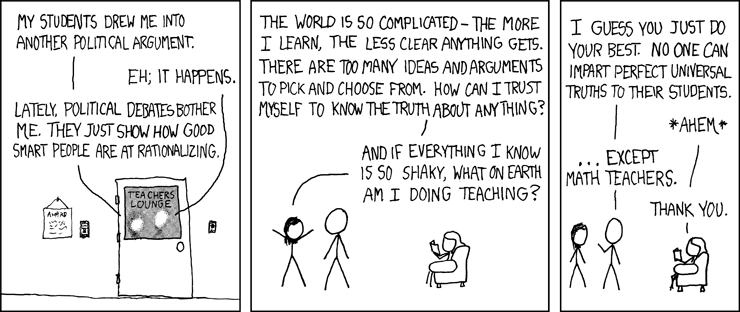|
MATH 728: Mathematical Projects & Partnerships Fall 2009 |

|
| Meeting times & place: | Tuesdays/Thursdays 2:10-3:25 T-H 2 (next to Trailer J) |
| Prerequisites: | Students in the course will concurrently be involved in projects working with middle or high school students. |
| Instructor: | Dr. Matthias Beck |
| Office: | Thornton Hall 933 |
| Office hours: | Thursdays 11:00-12:00 & by appointment |
This graduate seminar will focus on teaching and learning mathematical ideas in and out of school contexts. It provides the opportunity for students to relate the mathematics they are learning to the teaching and learning of mathematics and problem-solving skills at the middle and high school levels through participation in schools and innovative after-school projects such as Math Circles. One of the goals of the seminar is to enable students to examine mathematical learning in situations where schools and tests are not the sole arbiters of success. In considering places other than school where mathematics is learned, the rules change: Students will need to consider and explain what mathematical ideas are truly important for different audiences to understand, without falling back upon standardized tests as the ultimate indicators of what is important mathematically.
This course is designed for graduate students in the (CM)² program, however, it is open to all mathematics graduate students. Students will have the opportunity to actively experience Math Circles, which are after-school programs focusing on problem-learning skills through interesting math problems. They will see firsthand a non-traditional approach to teaching, work with middle and high school students from a variety of cultures, and learn and try out both problem-solving skills and research-based methods for teaching mathematics.
Grading system & due dates:
| 20% | Journal entries |
| 20% | Reflections on readings |
| 20% | Drafts of term paper (due October 20 & November 17) |
| 30% | Term paper (due December 10) |
| 10% | Participation |
I want to ensure that each of you accomplishes the goals of this course as comfortably and successfully as possible. At any time you feel overwhelmed or lost, please come and talk with me.
Journals: You will keep a journal about your involvement in the schools/after-school projects on our ilearn page. The entries are due by the Tuesday class.
Reflections: We will read various articles and books throughout the semester, and you will write a 1-2 page reflection paper after finishing each piece. The following is a partial list of articles/books and the deadline for your reflection.
| Alan Schoenfeld, Working with schools: the story of a mathematics education collaboration, Amer. Math. Monthly 116 (2009) | 9/3 |
| Sam Vandervelde, Circle in a Box, MSRI/American Mathematical Society, 2009 (Chapters 3 & 4) | 9/15 |
| Jay Gillen, An Insurrectionary Generation: Young People, Poverty, Education, and Obama, Harvard Educational Review 79 (2009) | 10/1 |
| John Allen Paulos, Innumeracy, Hill and Wang, 2001 | 10/27 |
| Robert & Ellen Kaplan, Out of the Labyrinth, Oxford University Press, 2008 | 11/17 |
| Robert Moses, Radical Equations, Beacon Press, 2002 | 12/3 |
Term Paper: Each student will work on a teaching project throughout the semester, either a lesson plan for your middle/high-school class, or a math circle session. Your term paper will consist of a detailed background section (mathematical background, what you expect from the students, etc.), a detailed lesson plan, and a reflection how this session worked out. A significantly worked-out draft is due on October 20. A second draft is due on November 17 and will be shared with the other class participants. Your paper should be addressed to an audience similar to our class and partner teachers. You're always welcome to discuss your papers with me before they are due.
On good writing: The library hosts an excellent Mathematics & Statistics research guide on strategies, reference citing, searching, and much more. As an optional writing guide, I recommend Gerald Graff & Cathy Birkenstein's They Say/I Say: The Moves That Matter in Academic Writing (W. W. Norton, 2007).
Some more general fine print:
SFSU academic calender
Tutoring
CR/NCR grading
Incomplete grades
Late and retroactive withdrawals
Students with disabilities
Religious holidays
This syllabus is subject to change. All assignments, as well as other announcements on tests, policies, etc., are given in class. If you miss a class, it is your responsibility to find out what's going on. I will try to keep this course web page as updated as possible, however, the most recent information will always be given in class. Always ask lots of questions in class; my courses are interactive. You are always encouraged to see me in my office.
